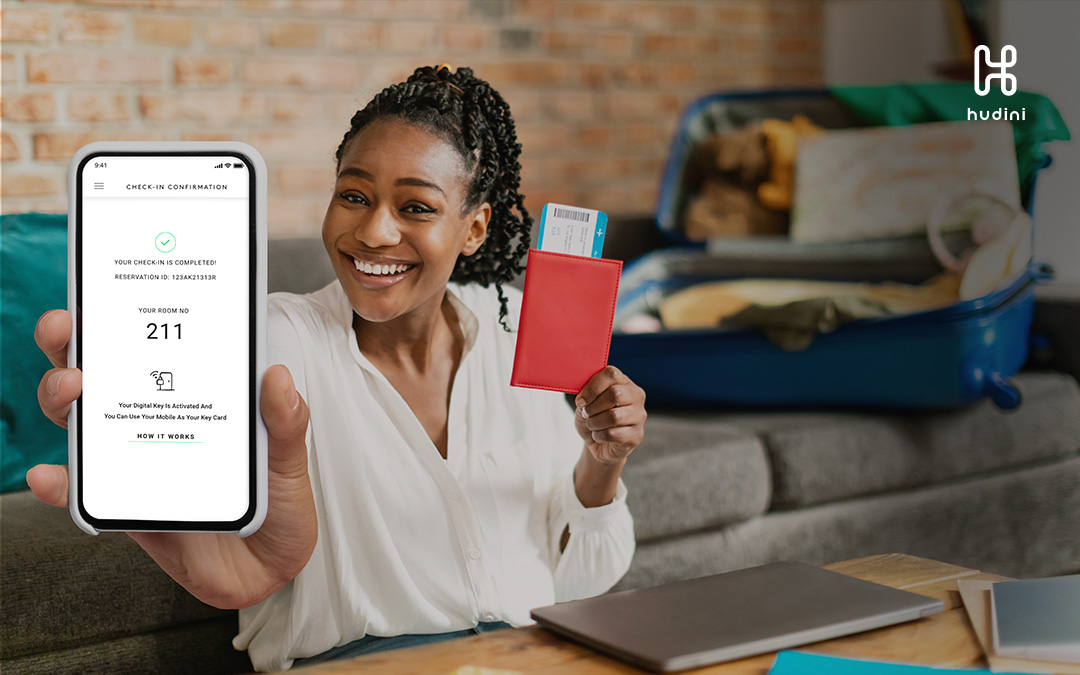
How can hotels encourage more guests to use hospitality apps?
Comparing flights on online portals, checking GPS for directions, booking a cab to the hotel – technology is the traveler’s best friend. So why are guests slow to adopt IoT and AI-enabled services at hotels?
The technology acceptance model (TAM) suggests that guests will adopt technology that’s useful and easy to use. Add personalization to the mix, and you have a winner. AI-based hospitality platforms like Hudini don’t just enrich the guest’s experience at a hotel, they can also surface revenue-generating opportunities by suggesting personalized services that guests will love.
The World Economic Forum’s Digital Transformation Initiative (DTI) estimated that between 2016 and 2025, “Digitalization in aviation, travel and tourism is expected to create up to US$305 billion of value for the industry through increased profitability.” The pandemic and its ensuing protocols might just have accelerated this change.
Hotels can make the most of this transformation by optimizing hospitality apps to boost usage among guests. Here are a few good ways to start.
- Deliver value
The apps we use every day offer one (occasionally, both) of these two benefits – convenience and delight. A hotel’s app or mobile website is no different. Imagine you’re traveling to a beach resort for an overdue holiday. Thanks to the resort’s digital check-in process, you spend less time in the lobby filling forms and more time in the infinity pool. Or if you’re traveling abroad for work, a chatbot with automatic translation capabilities could help you quickly access the hotel’s WiFi, without a single call to the front desk.
Demonstrate the benefits from the very first touchpoints, so that guests will be more open to exploring other tech-enabled services available on the app.
- Make it user-friendly
Hospitality technology is designed to simplify processes and amplify experiences. To that end, the app’s user interface should be easy to browse. If additional instructions are required, ensure that in-room signage and online tutorial videos are easily available. Guests often find it easier to ask the staff for assistance, so staff training is essential.
Moreover, we all use technology differently. When hospitality tech is seamless across devices, guests can enjoy the same experience whether they’re using mobile phones or in-room tablets.
- Offer incentives
Picture this – a guest at your restaurant spots a tent card offering a complimentary beverage on orders placed via the hotel app. The app’s downloaded, the order placed, and the guest’s interest piqued. While he waits for his meal, he might look at what else the app has to offer. If it’s easy and efficient, he’ll continue to use it for the duration of his stay. And, even the next one.
- Make it personal
This one puts the ‘hospitality’ in ‘hospitality tech’. Hotel apps can yield significant data about each guest’s preferences. Let’s say a guest lists a shellfish allergy on the app. All the dishes containing the allergen are immediately filtered out of the menu. During her next stay, she’s pleasantly surprised to see that the menu on her hotel app has automatically left out the dishes with shellfish. By constantly customizing the hotel’s offerings to the guests’ tastes, personalized hotel appsmake every stay better than the previous one.
- Connect multiple touchpoints
From booking to check-out, the hotel app that connects every point of the guest journey will deliver the best results.
Apart from enabling a digital check-in, apps can convert the guest’s mobile phone into their room key. The app’s screencasting feature offers access to their favorite entertainment and news channels; meanwhile, the chatbot can help them with anything from in-room dining to concierge services. Behavior prediction analytics can be used to deliver app notifications about hotel services that might interest them. At the end of their stay, the bills can be tallied in seconds to ensure a quick and efficient check-out.
- Ensure data protection and privacy
When a hotel is vigilant about data, its guests don’t have to be. Staff training (in areas such as collecting guest data at the front desk) can prevent data breaches caused by human error. Investing in cybersecurity, compliance with data security standards, encrypting payment information and backing-up data should be mandatory. Also, inform guests about how their data will be used to improve their stay.
The airline industry is an encouraging example of digitalization done right. The Star Alliance app, for instance, saves passengers the effort of downloading different apps for individual airlines; it also offers loyalty benefits to frequent flyers. Through it, customers book seats and meals on any flight in the network of 26 member airlines, track flights, view schedules and locate lounges. Meanwhile, data is shared between the airlines, enabling them to improve passenger experience and streamline their marketing efforts. It’s a model that can be easily replicated by hotel chains and alliances.
As for technology acceptance by guests, what is travel if not an exploration? When we travel for leisure, it’s to discover places and meet people; business travel is driven by emerging opportunities. Every guest who walks into a hotel is excited to try something new. What better time to introduce a technology platform that elevates your brand of hospitality?
Engage, Elevate.

Join our mailing list
Enter your email address


